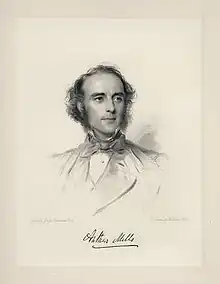Arthur Mills (MP)
Arthur Mills (20 February 1816 – 12 October 1898) was a British Conservative Party Member of Parliament (MP). In his career, he was also a barrister, magistrate, and author in Cornwall and London. His travels to the 19th century British colonies and his studies of their finances and systems of governance made him an expert in the field.
Arthur Mills | |
|---|---|
 Stipple engraving by William Holl, Jr., 1863 | |
| Born | Arthur Mills 20 February 1816 Barford, Warwickshire, United Kingdom |
| Died | 12 October 1898 (aged 82) United Kingdom |
| Occupation | M.P., barrister, magistrate, author |
| Nationality | British |
| Citizenship | |
| Period | Victorian England |
| Subject | 19th century Colonial politics and economics |
| Notable works | Colonial Military Expenditure (E. Stanford: London, 1863); Colonial Constitutions (John Murray: London, 1856); India in 1858 (John Murray: London, 1858); Systematic Colonisation (John Murray: London, 1848) |
| Spouse | Agnes Lucy Dyke Acland (1821-1895) |
| Children | Revd Barton R. V. Mills, son (1857-1932) Col. Dudley Acland Mills, son (1859-1938) |
| Relatives | Sir Thomas Dyke Acland, 10th Baronet, father-in-law John Acland (brother-in-law) George Mills (writer), author, schoolmaster, and grandson Arthur F. H. Mills, novelist and grandson Lady Dorothy Mills, novelist, travel writer, and granddaughter-in-law |
| Website | |
| www | |
Family
Mills was born in Barford, Warwickshire in 1816. He was the first surviving son (the second son born) of Revd Francis Mills and Lady Catherine Mordaunt.[1] He was educated at Rugby School under Dr. Thomas Arnold. He attended Balliol College in 1835[1] and earned an M.A. from Oxford in 1838.
Arthur Mills married Lady Agnes Lucy Dyke Acland, daughter of Sir Thomas Dyke Acland, 10th Baronet of Killerton, Devon, and Lydia Elizabeth Hoare on 3 August 1848.[1] They had two sons, Revd Barton R. V. Mills and Col. Dudley Acland Mills of the Corps of Royal Engineers.[2]
Grandchildren of Arthur Mills included children's book author and schoolmaster George Mills,[3] crime and adventure novelist Arthur F. H. Mills,[4] and Arthur Hobart Mills' wife, Lady Dorothy Mills, the renowned novelist, explorer, and travel writer.[5] From 1873 to 1885 Mills was a member of the London School Board representing Marylebone.[6]
Career
Mills became a barrister when he was called to the bar at the Inner Temple, London, in 1842.[1] He joined the Canterbury Association on 25 October 1849.[1] He was an MP for Taunton (1852–1853 and 1857–1865) and Exeter (1873–1880).[1]
Notable publications
Two of his publications, India in 1858 [1858] and Systematic Colonisations (now spelled 'Colonizations') [1848] are still in print, the former still being the definitive work on the costs and conditions of the Indian Rebellion of 1857. The manuscript for India in 1858 was proofed by his friend John Stuart Mill.[7]
Death
He died on 12 October 1898 at Efford Down, Budehaven, Cornwall.[1]
References
- Bain, Rev. Michael (2007). The Canterbury Association (1848-1852): A Study of Its Members' Connections (PDF). Christchurch: Project Canterbury. pp. 59–60. Retrieved 22 September 2012.
- The Plantagenet Roll of the Blood Royal. Heritage Books: Bowie, Maryland. p. 146.
- "Until the Peacock Led Him In". Who Is George Mills?. Retrieved 17 April 2010.
- "Arthur Mills Bibliography". Classic Crime Fiction. Retrieved 17 April 2010.
- "Lady Dorothy's latest journey: San Jose, California, to Ocala, Florida". Who Is George Mills?. Retrieved 17 April 2010.
- "The London School Board Elections". Daily News. 1 December 1873.
- "The Collected Works of John Stuart Mill, Volume XV, The Later Letters of John Stuart Mill 1849-1873". Online Library of Liberty. Retrieved 21 April 2010.